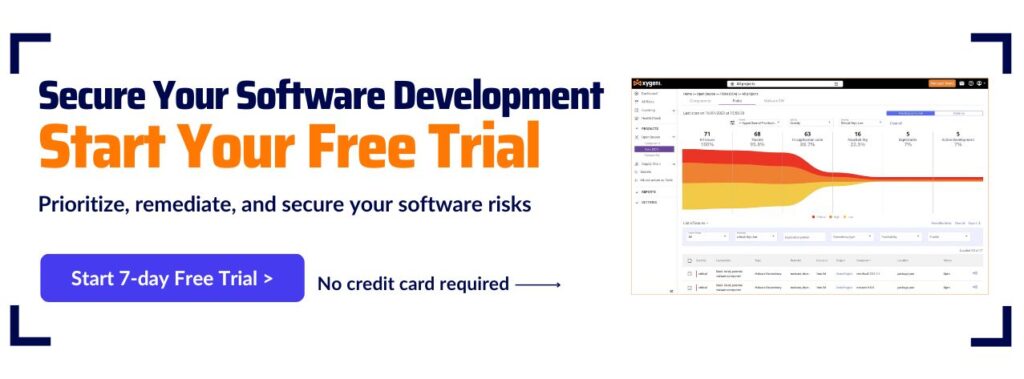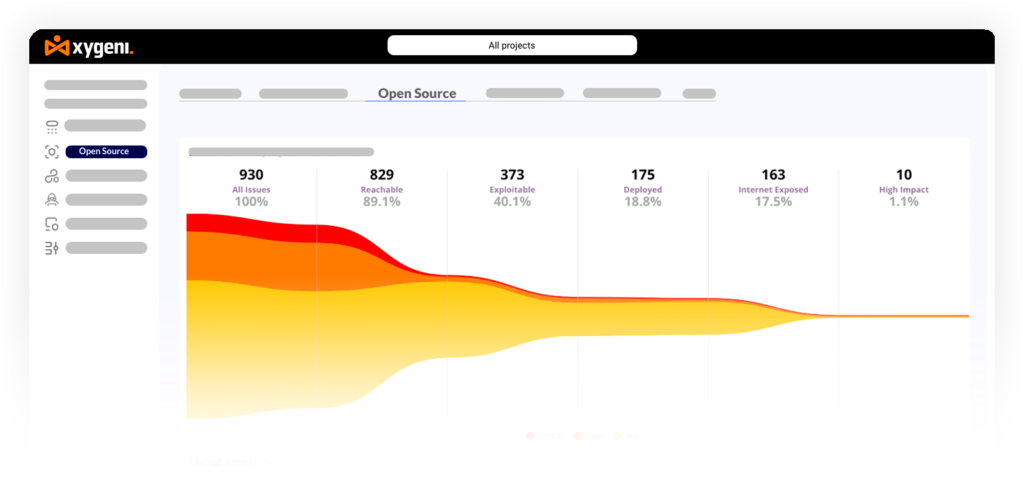Introduction to Open-Source Vulnerability Management
Reliance on open-source components for software development is more prevalent than ever, mainly due to their cost-effectiveness and flexibility. This usual practice reinforces the importance of having effective open-source vulnerability management tools at hand. Since organizations integrate these open-source elements into their software and applications, they sometimes expose themselves to many potential security risks and compliance challenges (most of which they are not even aware of).
As we said, the dependency on open-source components may introduce significant security challenges, because vulnerabilities within these components can compromise entire systems. This makes open-source vulnerability management tools not just a preventive measure but a critical component of the software development lifecycle. This applies especially to DevSecOps environments where, as you may know, speed and security must coexist harmoniously. Thus, vulnerability management software is essential to promptly identify, assess, and mitigate risks. Learn more about OSS and how to protect your organization!
In this blog post, you are going to find: a brief definition of what is open-source vulnerability management, a selection of some of the most important features vulnerability management tools must have to be taken into consideration, and a list of vulnerability management software available in the market. We hope this helps you to understand its huge importance. Shall we start?
But, what is Vulnerability Management?
Important before choosing among Vulnerability Management Tools!
Vulnerability management is a systematic approach that manages security threats in software components. It involves scanning, identifying, and mitigating vulnerabilities within a codebase, particularly those found in open-source components that might not be immediately evident. Open source vulnerability management not only helps maintain the security and integrity of software but also supports compliance with various security standards, making it indispensable in a DevSecOps context.
Read more about Vulnerability Management in our Glossary!
Some Basic Features Open-Source Vulnerability Management Tools Must Have
If you are looking for complete vulnerability management software for your team, here you will find some of the most important features you must take into account:
- Comprehensive Scanning Capabilities: vulnerability management tools must do deep and continuous scanning to detect vulnerabilities across all application layers.
- Automated Patch Management: automatic updates and patch applications to fix vulnerabilities quickly are another requirement for a complete vulnerability management software.
- Easy Integration: seamless integration with CI/CD pipelines to ensure that open source vulnerability management is part of the development process is a very important requirement too.
- Prioritization & Risk Assessment: the prioritization of vulnerabilities based on their severity and potential impact on the business, is a key feature your vulnerability management software should have.
- Real-Time Alerting and Dashboards: immediate notification of potential vulnerabilities and ongoing security incidents is crucial for timely response and proper resource allocation. Your vulnerability management tool should offer configurable alerts that must be able to be customized to the severity and nature of the issue, ensuring that the right people are informed without delay. Moreover, intuitive dashboards that provide a holistic view of an organization’s security posture, ongoing risks, and the status of remediation efforts are key for effective vulnerability management.
Overview: Xygeni specializes in proactive vulnerability management, offering a robust platform tailored for seamless integration into DevSecOps workflows.
Key Features of Xygeni’s Vulnerability Management Software:
- Vulnerability Detection in Real-time: Xygeni’s platform continuously monitors codebases and operating environments to detect vulnerabilities as soon as they emerge, providing immediate alerts to ensure rapid response.
- Automatic Remediation Strategies: it effortlessly implements corrective actions automatically to address identified vulnerabilities. In that way, the window of risk is reduced which facilitates a swift return to secure operations.
- Integration with CI/CD Tools: Xygeni also seamlessly integrates with already existing CI/CD pipelines. This allows to conduct security checks and vulnerability assessments at every phase of software development and deployment.
- Risk Assessment and Prioritization: this vulnerability management tool evaluates and ranks vulnerabilities based on their severity, potential impact, and exploitability, enabling teams to focus on addressing the most critical issues first.
Additional Benefits: on top of everything Xygeni also provides advanced analytics and customizable reports. Those enhance visibility and control over security management processes, aiding in strategic decision-making and continuous improvement of security postures.

Overview: Wiz integrates across multiple cloud environments to provide extensive visibility and control.
Key Features:
- Cloud Risk Assessment: this open source vulnerability management tool offers evaluations of cloud configurations and workloads that can help to identify security gaps and suggest optimizations.
- Continuous Monitoring: it keeps surveillance over cloud environments to detect and alert on security anomalies in real-time.
- Anomaly Detection: Wiz uses algorithms to identify unusual patterns and potential threats. With this, the tool helps to prevent breaches before they occur.

Overview: Aqua’s primary focus is on securing applications across its entire software lifecycle.
Key Features:
- Container Security: this vulnerability management software provides comprehensive security solutions for containerized environments.
- Serverless Function Protection: it also safeguards serverless functions against vulnerabilities and misconfigurations, and makes sure that they operate within secure parameters.
- Automated Compliance Checks: the tool helps with compliance and automatically enforces security policies and conducts audits.

Overview: Snyk is a user-friendly tool whose features are tailored specifically for developer-first vulnerability management.
Key Features:
- Open-source Tracking: the tool monitors open-source libraries used in projects to identify and track vulnerabilities.
- Code Analysis: it performs static analysis of source code to detect security flaws and suggest fixes.
- Dependency Scanning: also, the tool examines project dependencies for known vulnerabilities and offers updates or patches to mitigate risks.

Overview: Sonatype delivers precise intelligence about open-source vulnerabilities and remediation guidance.
Key Features:
- Component Lifecycle Management: the tool manages the lifecycle of software components to ensure they remain secure throughout their usage.
- Policy Enforcement: it automates the enforcement of security policies to maintain compliance and manage risk.
- Software Composition Analysis (SCA Security): analyzes software compositions to identify vulnerabilities within open-source components.

Overview: Mend offers comprehensive solutions for securing open-source software throughout the DevSecOps pipeline.
Key Features:
- License Compliance: this vulnerability management software ensures that software licenses are managed and adhered to, reducing legal and security risks.
- Effective Vulnerability Remediation: it also provides mechanisms for rapid remediation of identified vulnerabilities within open-source software.
Integration with Other - Development Tools: it works seamlessly with widely used development tools to enhance the workflow without disrupting existing processes.
This short overview provides a clear picture of the key features and benefits of leading vulnerability management tools. Open source vulnerability management enables security managers and DevSecOps teams to make informed decisions about which tools best suit their needs.
Watch our non-gated SafeDev Talk Episode on Scaling Application Security to learn more about how vulnerability management tools can help you scale effectively!
Are Open-Source Vulnerability Management tools really a necessity?
The short answer is yes. The integration of robust vulnerability management tools like the Wiz, Mend, Aqua, Snyk, Sonatype, or Xygeni into your software production is crucial to ensure the security and compliance of applications that rely heavily on open-source components.
However, by choosing a sophisticated tool such as Xygeni, your organization is not only going to address vulnerabilities effectively but also it is going to be able to enhance its overall security posture. It is the right choice for those seeking to optimize their DevSecOps environments. If your organization is looking to elevate its security strategies, considering Xygeni could be the pivotal step toward achieving enhanced security, compliance, and operational efficiency.
Explore Xygeni today to see how it can transform your vulnerability management strategy!
Also, take a look at our latest blogpost on “Why Every Organization Needs a Vulnerability Management Tool?”
How to Successfully Implement These Tools?
Implementing vulnerability management tools requires a structured approach to ensure their effectiveness in identifying and mitigating risks. Start by selecting the right vulnerability management software that aligns with your organization’s needs, considering features like integration capabilities, scalability, and support for open-source vulnerability management. Integrate the tool into your existing security framework, such as SIEM systems, to streamline monitoring and reporting. Configure automated scans for continuous vulnerability detection and ensure proper prioritization based on risk levels. Finally, establish workflows to remediate vulnerabilities efficiently while tracking progress to ensure compliance and a robust security posture.




